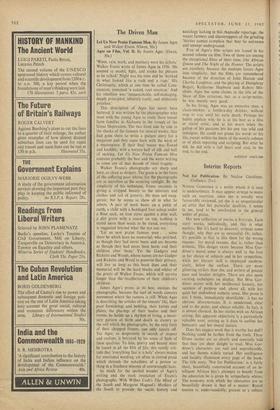The Driven Man
Let Us Now Praise Famous Men. By James Agee and Walker Evans. (Owen, 50s.)
'WIND, rain, work, and mockery were his tailors,' Walker Evans wrote of James Agee in 1936. 'He seemed to model, fight, and stroke his phrases as he talked.' Night was his time and he 'worked in what looked like a rush and a rage.' His Christianity, which at one time he called Com- munism, remained 'a naked, root emotion.' And his rebellion was 'unquenchable, self-damaging, deeply principled, infinitely costly, and ultimately priceless.'
This description of Agee has never been bettered. It was written by the photographer who went with the young Agee to study three tenant farm families in Alabama in the trough of the Great Depression. The two lived side by side in the shacks of the farmers for several weeks; they had gone there to write a picture story for a magazine and they came back with the warp of a masterpiece. If their final weave was flawed and knobbly, with a texture half of silk and half of sacking, Let Us Now Praise Famous Men contains probably the best and the worst writing to come out of that decade of rural tragedy.
Walker Evans's photographs are sharp and bare, as clean as despair. The grain is in the faces of the suffering poor whites, for the photographs are as merciless as the scouring sunlight. By the simplicity of his technique, Evans succeeds in giving a stripped beauty to the interiors and clothes and toil of poverty. He does not exag- gerate; but he seems to show all in what he selects. A pair of work boots on a patch of earth, a child with a bandaged foot asleep tinder a flour sack, an iron stove against a pine wall, a dirt grave with a saucer on top, nothing is stated more than needs to be stated, everything is suggested beyond what the eye can see.
'Let us now praise famous men . . . some there be which have no memorial; who perished, as though they had never been; and are become as though they had never been born; and their children after them.' Yet the Gudgers and Ricketts and Woods, whose names are not Gudgcr and Ricketts and Wood to preserve their privacy, will live as long as this book does and their memorial will be the hard blacks and whites of the prints of Walker Evans, which will survive longer than the recollections of their children's children.
James Agee's prose, at its best, outdoes the photographs, because the tool of words conveys movement where the camera is still. When Agee is describing the articles of the tenants' life, their poor furnishings and bedding, their knives and plates, the placings of their bodies and their rooms, he builds up a rhythm of living, a neces- sary pattern of birth and death in slavery to the soil which the photographs, by the very limit of their chopped frames, can only square off. Yet Agee, so desperately in search of respect and realism, is betrayed by his sense of both of these qualities. To him, poetry and beauty must be found in all the filth of life; this saintly atti- tude that 'everything that is is holy' always makes for emotional wording, yet often in clotted prose which shrouds the nakedness of a person or thing in a Southern miasma of overwrought haze.
So much for the spoiled wonder of Agee's writing and the stark revelation of Evans's photographs. With Wilbur Cash's The Mind of the South and Margaret Hagood's Mothers of the South to provide the social history and sociology lacking in this rhapsodic reportage, the tenant farmers and sharecroppers of the grinding 'thirties cannot complain that they lie unknown and unwept underground.
Five of Agee's film scripts are issued in his second volume on film. Two of them are among the exceptional films of their time, The African Queen and The Night of the Hunter. The scripts are excellent, because the medium forces Agee into simplicity; but the films are remembered because of the direction of John Huston and Charles Laughton, and the playing of Humphrey Bogart, Katharine Hepburn and Robert Mit- chum. Agee has some claims to the title of the Shaw of film criticism; but, as a script-writer, he was merely very good.
In his living, Agee was an excessive man, a chain-smoker, a bottle-a-day drinker, without stop or s;ay until his early death. Perhaps his habits explain why he is at his best as a film or social critic, and at his worst when the gallop of his passions lets his pen run wild and indulgent. He could not prune his words or his life, except within the limits of the weekly column or of plain reporting and scripting. But what he did, he did with a full heart and soul, to the end, to the end.
ANDREW SINCLAIR


































 Previous page
Previous page